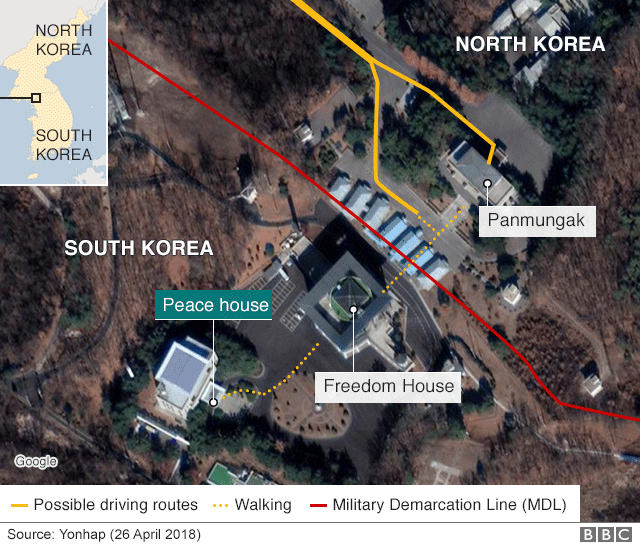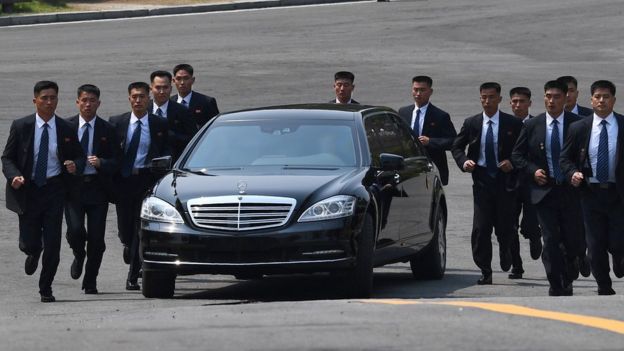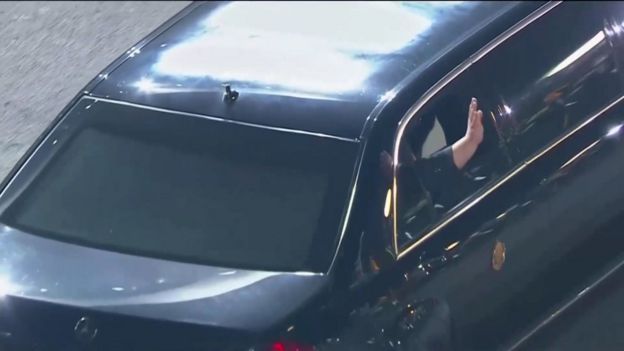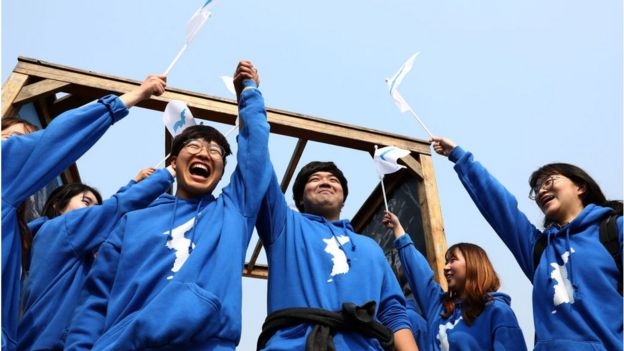- 19 minutes ago
-
(아시아) BBC: Koreas make nuclear pledge after historic summit국제문제/아시아 2018. 4. 28. 00:11
출처: http://www.bbc.com/news/world-asia-43921385
Koreas make nuclear pledge after historic summit
Welcoming Kim Jong-un with pomp and ritual
(pomp: 공식 행사나 의식의 장관, 화려함)
The leaders of North and South Korea have agreed to work to rid the peninsula of nuclear weapons after holding a historic summit. (rid A of B: A에서 B를 제거하다) (historic: famous or important in history 역사적인, eg. historic occasion) (historical: concerning history or historical events 역사적인, e.g. historical evidence)
The announcement was made by the North's Kim Jong-un and Moon Jae-in of South Korea after talks at the border.
The two also agreed to push towards turning the armistice that ended the Korean War in 1953 into a peace treaty this year. (armistice: 휴전, 휴전협정)
The summit came just months after warlike rhetoric from North Korea. (summit: 정상, 정상회담) (rhetoric: speaking)
Speaking at a banquet after Friday's talks, Mr Kim hailed the progress he said had been made.
"We bade farewell to the frozen relationship between North and South Korea, which was a nightmare. And we announced the beginning of a warm spring to the world," he said. (bid farewell to: ~에게 작별을 고하다)
Details of how denuclearisation would be achieved were not made clear and many analysts remain sceptical about the North's apparent enthusiasm for engagement. (details: 상세한 부분, 세부적인 부분) (denuclearisation: 비핵화)
An issue for the North is the security guarantee extended by the US, a nuclear power, to South Korea and Japan and its military presence in both countries.
Previous inter-Korean agreements have included similar pledges but were later abandoned after the North resorted to nuclear and missile tests and the South elected more conservative presidents.
Mr Kim said the two leaders had agreed to work to prevent a repeat of the region's "unfortunate history" in which progress had "fizzled out". (fizzle out: 흐지부지되다)
"There may be backlash, hardship and frustration," he said, adding: "A victory cannot be achieved without pain." (backlash: 반발)
Kim Jong-un issues his pledge for peace with South Korea
Other points the leaders agreed on in a joint statement were:
- An end to "hostile activities" between the two nations
- Changing the demilitarised zone (DMZ) that divides the country into a "peace zone" by ceasing propaganda broadcasts
- An arms reduction in the region pending the easing of military tension (pending: 어떤 일이 있을 때 까지)
- To push for four-way talks involving the US and China
- Organising a reunion of families left divided by the war
- Connecting and modernising railways and roads across the border (across: 부사. 가로질러, 건너서)
- Further joint participation in sporting events, including this year's Asian Games
The commitment to denuclearisation does not explicitly refer to North Korea halting its nuclear activities but rather the aim of "a nuclear-free Korean peninsula". (explicitly: 분명히)
The two countries have also agreed to seek international support to reach this goal, the joint statement says.
China later praised the political determination and courage of both leaders and said it hoped the momentum could be maintained. (momentum: 탄력, 가속도)
US President Donald Trump also welcomed the news, tweeting that "good things are happening".
How did the summit unfold?
The leaders were met by an honour guard in traditional costume on the South Korean side. The pair walked to the Peace House in Panmunjom, a military compound in the DMZ between the two countries. (의장대: an honour guard)

Mr Kim then invited the South Korean president to step briefly across the demarcation line into North Korea, before the pair stepped back into South Korea - all the while holding hands.
It was an apparently unscripted moment during a highly choreographed sequence of events. (unscripted: 대본에 없는, 즉흥의) (choreograph [|kɔ:riəgrӕf]: 안무하다, 연출하다) (sequence: 연속적인 사건, 차례, 순서)
The moment Kim Jong-un crossed into South Korea
The two leaders spoke together during a session broadcast live on South Korean TV.
Mr Kim jokingly apologised to Mr Moon for repeatedly forcing him to get up early because of the North's missile and nuclear tests.
"I heard you [President Moon] had your early morning sleep disturbed many times to attend National Security Council meetings," he said. "I will make sure that your morning sleep won't be disturbed."
"Now I can sleep in peace," Mr Moon replied.
Mr Kim also acknowledged that the North's infrastructure lagged behind that of the South. (lag behind: 뒤떨어지다)
"I'm worried that our transport situation is bad so it may discomfort you, it may be embarrassing [for me] if you visit North Korea after living in the South's environment," he said.
After separating for lunch, the two leaders took part in a tree-planting ceremony using soil and water from both countries.
 GETTY IMAGES
GETTY IMAGESMr Kim travelled in a car surrounded by jogging bodyguards They later attended a banquet where Mr Kim was expected to be served the Swiss potato dish rösti - a nod to his time studying in Switzerland - along with the North's signature dish of cold noodles, and a North Korean liquor. (signature dish: 요리사의 가장 유명한 요리)
Mr Kim was accompanied for the symbolic discussions by nine officials, including his powerful and influential sister, Kim Yo-jong.
So far there has been no mention of the summit's outcome on North Korean TV.
Why was this summit so important?
The meeting - the first between Korean leaders in more than a decade - is a step toward possible peace on the peninsula and marks the first summit of its kind for Mr Kim.
He is also due to meet Mr Trump at a proposed meeting in the coming weeks - an unprecedented move.
 REUTERS
REUTERSMr Kim waved as he returned to North Korea How did we get here?
Few had predicted a development like this, as North Korea continued its nuclear and missile tests and stepped up its rhetoric through 2016 and 2017.
The rapprochement began in January when Mr Kim suggested he was "open to dialogue" with South Korea. (rapprochement [|rӕproʊʃ|mɑ:n;-prɑ:ʃ-]: 화해, 관계회복)
The following month the two countries marched under one flag at the opening ceremony of the Winter Olympics.
 GETTY IMAGES
GETTY IMAGESMany South Koreans were overcome with emotion as they saw the historic moment on TV While Seoul warned that a deal to rid Pyongyang of its nuclear weapons would be "difficult", Mr Kim announced last week that he was suspending nuclear tests.
Chinese researchers have indicated that North Korea's nuclear test site may be unusable after a rock collapse.
'국제문제 > 아시아' 카테고리의 다른 글
(아시아) 6·12 북미정상회담 공동성명의 전문 + 영문 원문(full text) (0) 2018.06.13 (아시아/동영상) BBC: 북미정상회담+기자회견 (0) 2018.06.13 (아시아) BBC: Koreas summit: Five key moments from the Kim-Moon meeting (0) 2018.04.27 (아시아/오디오) BBC: The Bombing Of Korean Flight 858 (0) 2018.02.28 (아시아) 동계올림픽 한국 컬링의 깜짝 슈퍼스타들 (0) 2018.02.22


